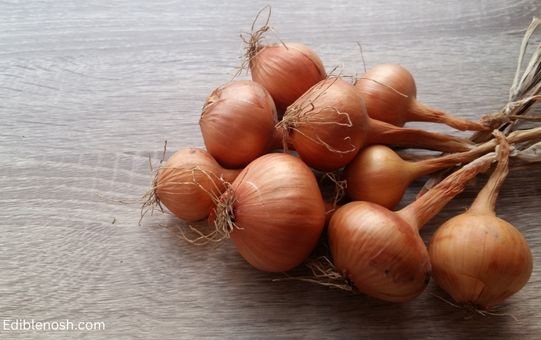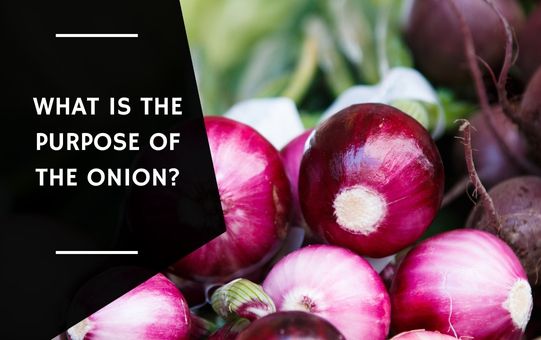What is the purpose of the onion? What function does the onion serve? The onion serves as a metaphor for an idea that has been exhaustively described. Once the topic has been comprehended, it is explained.
Onions provide a multitude of functions. It adds taste and depth to foods, has possible health advantages, and has a long and significant cultural past. It is also used as an insect repellant and in homemade beauty treatments.
In this article, we’ll examine the simple onion’s numerous uses and find why it’s an essential ingredient in so many meals.
Contents
Why does the Purpose of the onion matter?
The purpose of onion may seem like a trivial matter, but it can actually have significant implications for how it is used in cooking. Different types of onions have distinct flavors and textures that make them better suited for certain dishes. For example, sweet onions are great for caramelizing, while red onions are often used raw in salads.
Understanding the purpose of the onion can also help with meal planning and recipe development. If a dish calls for a specific type of onion, it’s important to use the right one in order to achieve the desired flavor and texture.
Furthermore, knowing the purpose of the onion can also help with selecting the right storage method. Some onions, like Vidalia onions, are more perishable than others and should be kept in the refrigerator. Others, like yellow onions, can be stored in a cool, dark place for several weeks.
In short, understanding the purpose of the onion can make a big difference in the success of a dish, as well as in the overall efficiency of meal planning and storage.
Historical and Cultural Significance
The onion has a long history and has played a significant role in many cultures around the world. It has been cultivated for thousands of years and was even used as a form of currency in ancient civilizations.
In ancient Egypt, onions were believed to have medicinal properties and were often used in remedies to treat a variety of ailments.
In some cultures, onions are also seen as a symbol of prosperity and good fortune. In India, for example, it is common to present newlyweds with a garland of onions and garlic as a symbol of fertility and good luck.
In the United States, onions were once an important crop for farmers, and the annual National Onion Association convention was a major event in the agricultural industry.
Culinary Uses
Let’s start with the most obvious use for onions: cooking. Onions are a member of the allium family, which also includes garlic, leeks, and chives.
They are often used as a base for soups, stews, and sauces, and can also be grilled, caramelized, or pickled.
The onion’s strong flavor makes it a key ingredient in many savory dishes, and it can be used in both raw and cooked forms.
One of the unique properties of onions is their ability to bring out the flavors of other ingredients.
When used in cooking, onions can help to balance and enhance the flavors of the dish. They are also a source of antioxidants, which can help to reduce inflammation and boost the immune system.
Health Benefits
In addition to their culinary uses, onions have a number of potential health benefits. They are a good source of vitamin C, which can help to boost the immune system and protect against illness.
Onions also contain compounds called flavonoids, which have been linked to a number of health benefits including reduced risk of heart disease and cancer.
Some studies have also suggested that onions may have anti-inflammatory properties, which could be beneficial for conditions such as asthma and arthritis.
Additionally, onions contain a type of fiber called fructooligosaccharides, which can help to promote healthy digestion and prevent constipation.

Environmental Impact
While onions have many uses and benefits, it’s important to consider their environmental impact as well.
Onions are a relatively low-maintenance crop and can be grown using sustainable farming practices, which can help to reduce their impact on the environment.
However, the transportation and storage of onions can have a larger carbon footprint, as they often need to be shipped long distances to reach consumers.
Overall, the purpose of the onion is multifaceted. It adds flavor and depth to dishes, has potential health benefits, and has a rich history and cultural significance.
While it’s important to consider the environmental impact of onions, they can also be a sustainable and healthy addition to your diet.
Read Also: What To Use If You Don’t Have Onions?
The Nutritional Value of the Onion
The onion is a nutritious vegetable that is low in calories and a good source of several essential nutrients. Here is a table outlining the nutritional value of onions per 100 grams:
| Nutrient | Amount |
|---|---|
| Calories | 40 |
| Protein | 1.1g |
| Fat | 0.1g |
| Carbohydrates | 9g |
| Fiber | 1.3g |
| Vitamin C | 16% of the RDI |
| Vitamin B6 | 5% of the RDI |
| Folate | 4% of the RDI |
| Manganese | 10% of the RDI |
In addition to the nutrients listed above, onions also contain a number of other vitamins and minerals, including vitamin E, vitamin K, calcium, and potassium. They are also a good source of antioxidants, which can help to reduce inflammation and protect against illness.
It’s worth noting that the nutritional value of onions can vary depending on how they are prepared.
For example, cooked onions may have slightly different nutrient levels than raw onions, and the addition of other ingredients or seasoning can also affect their nutritional value. However, overall, onions are a nutritious and healthy addition to any diet.
Additional Uses for Onions
In addition to their culinary and health benefits, onions have a number of other uses as well. Here are a few examples:
- Insect repellent: Onions contain a chemical called sulfur, which is believed to be effective at repelling insects such as mosquitoes and flies. You can use sliced onions as a natural insect repellent by placing them around your home or patio, or you can make your own mosquito repellent by mixing onions with water and a little bit of vinegar.
- Aromatherapy: The strong, pungent scent of onions can be used in aromatherapy to help clear the sinuses and alleviate respiratory issues. You can place a few sliced onions in a bowl of hot water and inhale the vapors to help clear congestion, or you can use a few drops of onion essential oil in an aromatherapy diffuser.
- First aid: Onions have been used as a natural remedy for a variety of ailments. Some people believe that applying a slice of onion to a bee sting or insect bite can help to reduce pain and swelling. Onions can also be used as a natural antiseptic to help clean and protect wounds.
- Beauty treatment: Onions are often used in homemade beauty treatments due to their high sulfur content. Sulfur is believed to be beneficial for improving the texture and appearance of the skin, and it is commonly used in acne treatments. You can make a face mask by blending together a few tablespoons of onion juice with honey and yogurt, or you can add a few drops of onion oil to your favorite moisturizer for a natural skin-boosting effect.
Read Also: Why Did Cutting Off Onions Cause Tears?
Conclusion
The onion is a versatile and nutritious vegetable that has a number of uses beyond just adding flavor to your food. From its potential health benefits to its cultural significance, the onion is an integral part of many dishes and has a rich history.
Whether you’re using it in the kitchen, as an insect repellent, or as a natural remedy, the onion is an invaluable addition to any home. So next time you’re cooking with onions, take a moment to appreciate this humble yet powerful vegetable and all that it has to offer.
FAQs | Purpose of the Onion
Here are a few FAQs related to the purpose of onion:
What Are The Main Culinary Uses For Onions?
Onions are a staple ingredient in many dishes and are used in a variety of ways in the kitchen.
They can be sliced and added to salads, sandwiches, and burgers for flavor, or they can be cooked down to create the base for soups, stews, and sauces. Onions can also be caramelized, grilled, or pickled for added flavor.
What Are The Potential Health Benefits Of Onions?
Onions are a good source of vitamin C and contain compounds called flavonoids, which have been linked to a number of health benefits. Some studies have suggested that onions may have anti-inflammatory properties and may be beneficial for conditions such as asthma and arthritis.
They also contain a type of fiber called fructooligosaccharides, which can help to promote healthy digestion and prevent constipation.
How Have Onions Been Used Throughout History?
Onions have been cultivated for thousands of years and have played a significant role in many cultures around the world.
In ancient Egypt, they were believed to have medicinal properties and were often used in remedies to treat a variety of ailments. In some cultures, onions are seen as a symbol of prosperity and good fortune, and they were once an important crop for farmers in the United States.
What Are Some Additional Uses For Onions?
In addition to their culinary and health benefits, onions have a number of other uses as well. They can be used as a natural insect repellent, in aromatherapy to help clear the sinuses, and as a natural remedy for a variety of ailments such as bee stings and insect bites.
Onions are also often used in homemade beauty treatments due to their high sulfur content, which is believed to be beneficial for improving the texture and appearance of the skin.
What Is The Environmental Impact Of Onions?
Onions are a relatively low-maintenance crop and can be grown using sustainable farming practices, which can help to reduce their impact on the environment.
However, the transportation and storage of onions can have a larger carbon footprint, as they often need to be shipped long distances to reach consumers.

